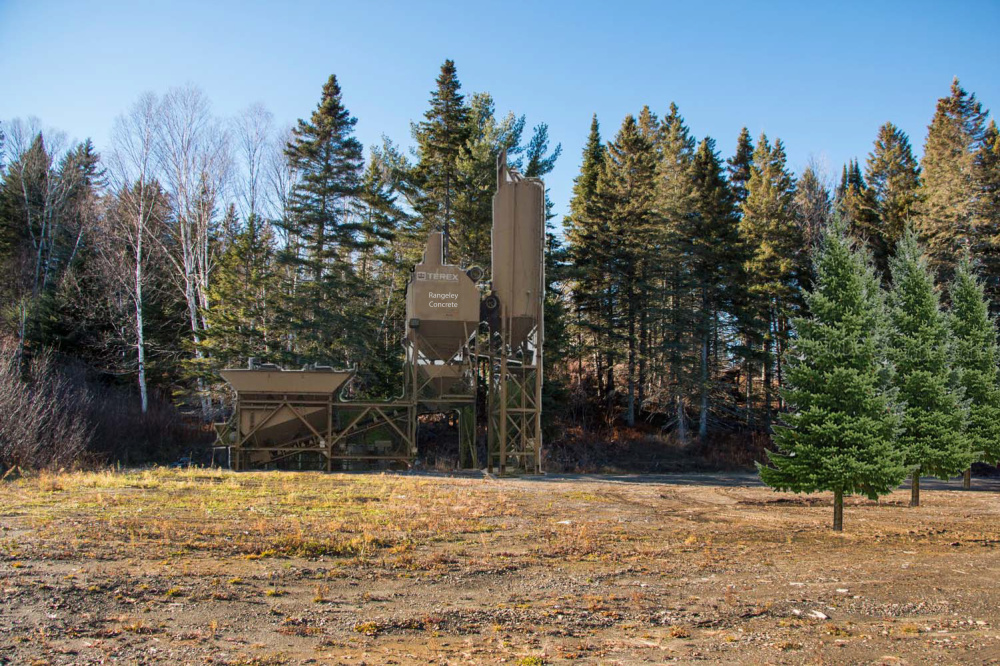RANGELEY — Voters have rejected a six-month moratorium on industrial projects in town commercial zones, but the issue is likely to remain a contentious topic with a group of residents vowing to appeal the approval of a proposed concrete plant that sparked the zoning fight.
The vote came during a contentious special town meeting Monday night largely focused on the proposed concrete plant in the Cemetery Hill commercial subdivision.
At least 150 Rangeley residents, business and second-home owners crowded into the town’s fire station for the meeting, hearing from a variety of speakers, including Stephen Langsdorf, the town attorney; David and Kenneth Haley, of M&H Construction, the company proposing the plant; and multiple opponents of the moratorium.
In a preview of the vote’s outcome, no one spoke in favor of the proposed six-month stay. Filling out secret written ballots, town residents voted 116-31 against the proposal.
“I’m ecstatic. We worked hard. All we wanted was a fair process,” Kenneth Haley, M&H Construction’s general manager, said following the vote. “I’m just so happy, so happy for this turnout and the residents of Rangeley voicing their concerns and standing up and voting.”
But Monday’s vote is unlikely to be the last word on the issue. Several residents with properties near the site of the proposed plant already have filed a request that the Rangeley zoning board of appeals reconsider its previous ruling in favor of M&H.
One of those residents, Judith Morton, 61, has lived in Rangeley all her life and said her concerns about the project were myriad. Morton, who also helped circulate the petition requesting the town vote on the moratorium, said she and her husband knew they would be living next to a commercial subdivision when they bought their property around 1998 but never could have imagined they’d have a concrete plant as a neighbor.
Now they worry that the proposed plant would hurt their property value.
“It’s our home. It’s our main retirement investment,” Morton said. “I’m not one of those flatlanders. I don’t have anyplace else to go.”
Morton worries about potential pollutants emanating from the plant as well as the strain it might place on the area water supply. She is concerned the plant and trucks will generate a significant amount of noise and thought locating the plant off of Rangeley’s 36-mile national scenic byway could discourage tourism to the area.
“Our comprehensive plan identifies 13 scenic views in the town of Rangeley, and that’s how it differentiates us from other communities,” Morton said. “It’s a resource that needs to be protected, and the very first one (the comprehensive plan talks) about is Cemetery Hill.”
In a letter to the Planning Board this month, M&H offered several changes to the plant proposal in an attempt to address some of residents’ concerns. The company offered to rinse and wash trucks at alternate locations to prevent potential runoff to Hatchery Brook and Rangeley Lake. They also offered to plant trees to block views of the plant from Route 4, shift the start of business from 6 a.m. to 7 a.m. and grade the property to capture runoff in a sediment pond. Haley said some elements of the plant would use electric motors, which would cut down on noise and emissions.
In tests, the company found the diesel-run front-end loader registered at 65 decibels near the entrance to Rangeley Manor Drive, or the approximate equivalent of a vacuum cleaner. Traffic on Route 4 averaged about 76 decibels, Haley said.
Regarding Morton’s concerns about water use, Haley said based on the current proposal the plant would not pull from the local aquifer and would instead take water from Rangeley Lake and store it in a 4,000-gallon surge tank mounted on a Mack truck. The truck then would pump water into waiting cement trucks. Haley projected the plant would use a maximum of 4,900 gallons a week.
To date, much of the controversy around the plant has centered on whether it qualifies as light or heavy industrial use under the town’s zoning ordinance. Rangeley currently allows for only light industrial projects in its commercial zones.
The town’s former code enforcement officer, Robert Folsom, initially found that the proposed plant qualified as light industrial use under the town’s zoning ordinance. His findings were seconded by both the planning and appeals boards.
Following a public hearing on the project in which residents requested clarification on the ordinances, as well as similar requests directed to Folsom, the town sought Langsdorf’s opinion, according to Cyndy Egan, chairwoman of the selectmen.
In a Dec. 22 letter, Langsdorf and fellow Preti Flaherty attorney Kristin Collins concluded the plant fell under heavy industrial use and advised Folsom to withdraw the project from the Planning Board’s purview. Five days later, Folsom notified M&H.
At Monday’s meeting, Langsdorf acknowledged the differing interpretations of the zoning ordinances and framed the moratorium as an opportunity for the town to rewrite the ordinances in a way that would indicate clearly whether the concrete plant fell under light or heavy industrial use. If voters rejected the moratorium, Langsdorf said, the issue was more likely to be resolved by the courts.
Proponents of the moratorium also had attempted to address concerns that current ordinances do not align with the town’s 2012 comprehensive plan. Included in the warrant article on the stay was language stating the moratorium was intended for the “express purpose” of re-examining and revising the town’s zoning ordinances to confirm they “are in conformance with the Comprehensive Plan, and to ensure that no permissible uses will cause undue harm on existing uses in said Districts.”
With the moratorium’s defeat, the fight over the proposed concrete plant will return to the zoning board of appeals, Langsdorf said.
Kate McCormick — 861-9218
kmccormick@centralmaine.com
Twitter: @KateRMcCormick
Send questions/comments to the editors.



